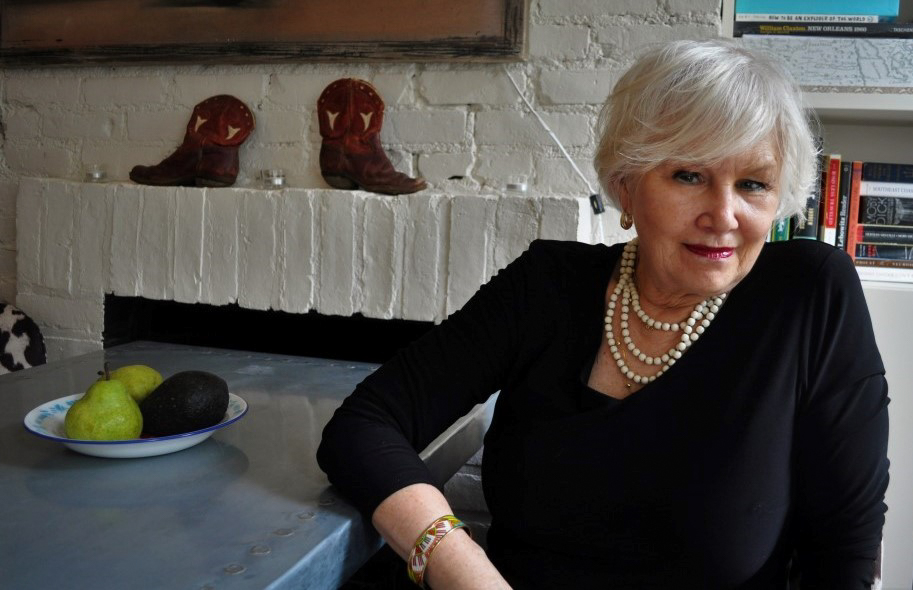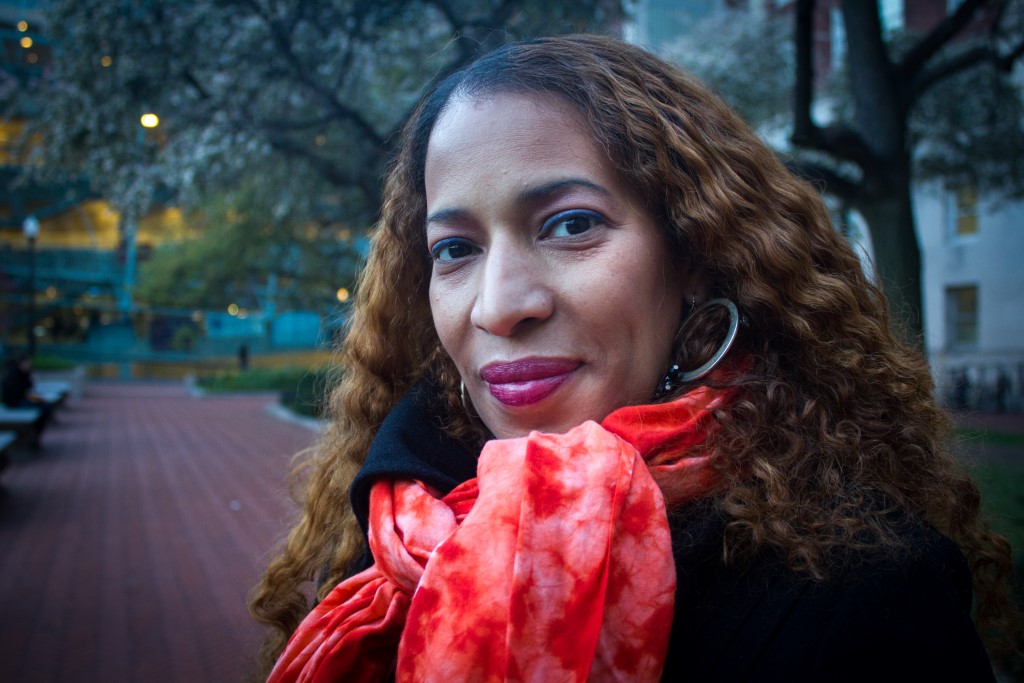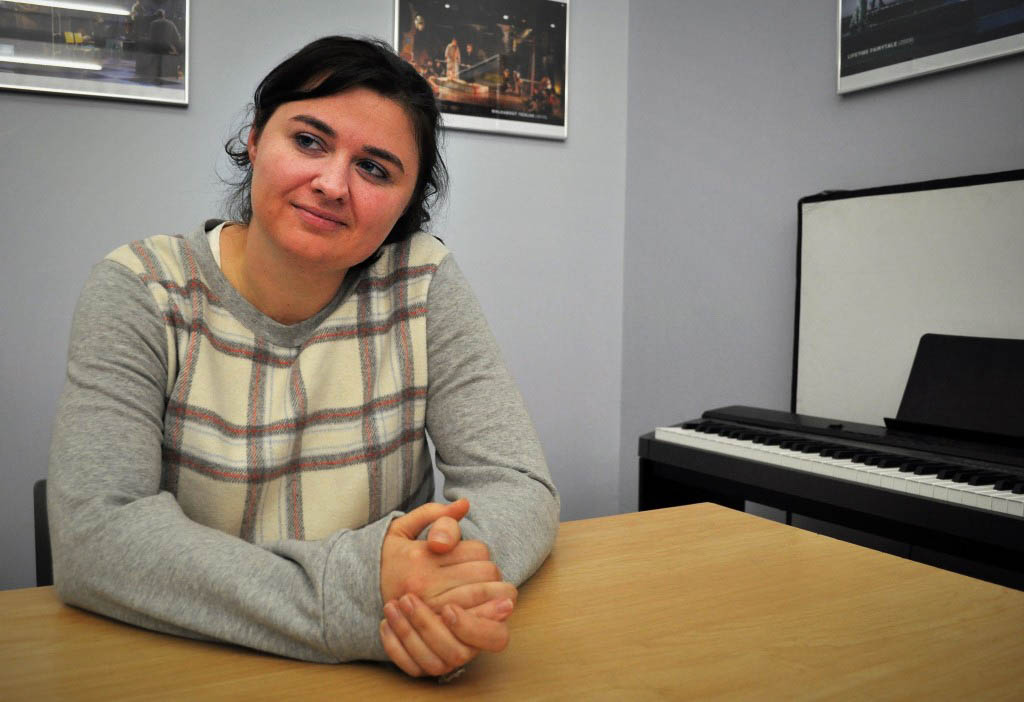gUN COUNTRY
Honest Voices From a Cultural ChasmSomeone dies from gun violence every 16 minutes in America. And each bullet creates ripples. Even a gun that is never fired has an effect. To explore those stories, Houses on the Moon, a New York-based theater company, hosted a series of storytelling workshops on gun violence, with a range of participants. Houses on the Moon sought people whose lives have been touched by guns, and worked with them to shape their stories. From the workshops emerged gUN COUNTRY, a theatrical exploration of firearms in America. The production includes several monologues and a play based on the relationship of two of the participants. Caroline Spivack of NY City Lens spent time with a number of participants. Here are three of the storytellers and their experiences:
Brenda Currin: Gun or No Gun

The dog was the first to hear the intruder. Sweetie, the Jack Russell Terrier, marked his presence with a low growl and roused Brenda Currin from her sleep. She lay in bed with her eyes fixed in the darkness. She thought of her friend’s loaded revolver in the top drawer of the nightstand. But once she rose, Currin inched toward the danger without it. For what felt like an eternity, she paused in the doorway her mind racing between gun or no gun.
The question remains fresh on her mind as if it had happened yesterday: gun or no gun? She can’t explain what made her move past the doorway empty handed that Christmas night in 2002, but when a shadowy figure lunged toward her and the lights were snapped on to reveal a drunk, disoriented, and terrified 17-year-old, Currin was eternally grateful she did not have a gun in her hand.
“I could have easily killed this boy,” said Currin. She paused for a long quiet moment as if she was mulling the scene over in her head. “I don’t think I would have gone to prison, but it would have been the central suffering of my life.”
According to the Pew Research Center, the top reason American gun owners say they own a gun is for protection, for experiences like Currin’s when a stranger creeps into their home. But just as easily as a gun can be lifted and a trigger pulled, an innocent life can be lost.
In her monologue, Currin confronts those split-second decisions that can alter the course of several lives. Even though she did not pull a trigger, the potential tragedy weighs heavy on Currin’s conscience. “The main idea is if you don’t have a gun in the house one doesn’t wrestle with those decisions,” said Currin. “Something in my body just moved me away instead of toward getting the gun, but it could have gone either way.”
For all the pain that guns can cause, Currin recognizes the often overlooked layers of emotions one can experience with firearms. From the warm memory of shooting a nest of water moccasins on her grandparent’s tobacco farm with her father – the recoil of the shotgun so strong that 10-year-old Currin nearly tumbled back into a pond – to the anxiety of using a gun for protection, to her mother’s terror of sleeping above the loaded black pistol that was tucked under her husband’s side of the mattress.
For Currin, each experience reveals truths about guns, but perhaps none more poignant than remembering that the convenience of a loaded gun is not a license to use it.
At times when Currin is feeling euphoric with life and those moments are punctured by reality, she finds herself reminded of regrets. Still, she does not have to think about the mother of the 17-year-old boy. And during hard days that end in reflection, Currin finds herself saying out loud, “But I did not kill Brian.”
Cristina Hernandez: “When You Have No Control”

Cristina Hernandez grew up in the South Bronx, where she learned how not to be shot as a bystander. Her guidelines go something like this: When you hear the shot drop the double Dutch ropes and hide low between the cars. When hanging out in front of a building always sit on the steps where there’s cover. Never stand and lean against the building. And don’t stick your head out of the window until at least 30 seconds after the sound of flying bullets.
Nightfall came with the guarantee of gunshots. The next morning was followed by figuring out if it was someone you knew, paying your respects if they had been killed, and continuing on with the day. The Hernandez family had moved to the area from the Dominican Republic and had few options but to adjust.
“When someone was shot and killed, people were definitely sad but it was like, ‘Oh this is what it is, this is where we live, and this is what happens,’” said Hernandez. “For you to survive you can’t really go there, you know? You have to skim the surface and you can’t really go deep because then what are you going to do with those feelings when you live in a place like that?”
In a conversation where gun advocates and their opponents often drown out the more nuanced aspects of gun violence, Hernandez explores the lasting trauma of living with gun violence as a regular occurrence. In her monologue, she recalls how routine shootings became a sort of spectacle for her and her friends. One Friday evening when she was 13, Hernandez and a friend walked to Roberto’s Pizza to pick up a pie for dinner. As the string was being tied on the box shots rang out. Abandoning the pie, Hernandez and her friend bolted toward the gunfire to get a closer look. They tailed the shooter until the man he was chasing fell in the street. Three bullet holes in his chest.
“I became a little bit obsessed with, you know, they say seeing the life leave your body. I was always like, ‘Wow, what is this person thinking now?’” she said. “I think everybody has different coping mechanisms.”
When Hernandez began to form her story she wasn’t convinced she had much to contribute but, as she examined her past, it dawned on her that she had experienced a dimension of gun violence that is commonly overlooked. “It sort of came to me that there’s this other part of it,” she said. “It’s not the part where you totally hate guns or the part where you love or are comfortable with guns, my point of view was being in a situation where you have no control, so how do you cope with that?”
For some, that coping comes in the form of burying those emotions until they emerge later in life. Hernandez believes her anxiety and occasional panic attacks are a manifestation of growing up steps away from shootings. You are expected, she said, to “cope with it, move on, don’t think about it too much, you just gotta deal with it. So I think you gotta push it down and maybe this is part of the residue.”
Jenna Worsham: Straddling a Cultural Chasm

When Jenna Worsham thinks of guns, she thinks of her father’s truck and the smell of old leather. Thoughts of guns conjure images of the countryside, of home. Before she moved to New York that’s what guns were, pieces of warm memories like shooting skeet in the backyard every Thanksgiving.
“I love guns. I grew up with them. They’re more of a sport for me. I always felt safe with them,” she said. “When I came to New York and began leaving the culture I grew up in in a lot of ways my view widened.”
After studying theater at Washington Lee University in Virginia, Worsham moved to New York City and co-founded The Middle Voice Theater Company. Her world quickly expanded from the small town reality of Cumming, Georgia to the melting pot of perspectives in the city. But with that growth came a tension, one she examines in her monologue.
“Depending on where you live you can have a narrow but valid view on guns,” she said. “I think theater makes it a safe place to explore.”
Here her friends and co-workers are people who grew up in places where the word gun is synonymous with fear and death. Guns took on a new quality for Worsham and she now sees the importance of regulation. But when city people spoke of the south, it stung to hear words like “hick” and “red neck” – words that lacked respect and reduced her family to gun-blazing caricatures.
Sometimes Worsham feels as though she has one foot planted in north Georgia and the other in New York, with the gap between the two filled with arguments that are lost in cultural translation. Words like “regulation” are interpreted as a sort of dismantling of southern culture. And those who oppose guns zoom in on “hate.” The cultural chasm between the north and the south that has fostered a deep mistrust.
Both worldviews are valid to Worsham. Both misunderstood.
Worsham, who now refers to herself as a “liberal-middleclass-gay-white girl,” has broached the gun debate with her family back in Georgia, which she said has led to some pretty dramatic Christmases. Although her perspective has shifted, her love of guns remains unchanged.
“You will never reach people when you are blind to what they look like and who they are, what they believe in,” Worsham wrote in her monologue. “If you want them to listen, down south, then you have to listen too. To the ones who mean well. They’re down there. I promise.”
The Impact
One Shoe At A Time: A Mother Turns Pain Into Purpose
An Unsolved Shooting Baffles a Mom for Two Decades
How Grief and Anger Turned Into Action
Silver Gun: A Robbery in Queens
Shooter: “It’s Either Them or Me”
After a Single Dad is Shot, a Community Reels
